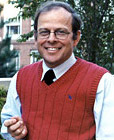Graham A. Colditz, M.D., Dr.P.H., has been named the Niess-Gain Professor and associate director of Prevention and Control at the Siteman Cancer Center at Washington University School of Medicine and Barnes-Jewish Hospital in St. Louis. He will have overall responsibility for overseeing research, education, and community outreach in cancer prevention sponsored by the Center.

“To recruit someone of Dr. Colditz’s stature is a tremendous opportunity,” says Timothy J. Eberlein, M.D., director of the Siteman Cancer Center. “He is one of the foremost leaders in his field and people gravitate to him and to his vision. We already have a comprehensive prevention and control program, but now we have the opportunity to become the best in the world. This is a highly significant milestone in the evolution of the Siteman Cancer Center.”
Colditz is a newly elected member of the Institute of Medicine, a highly prestigious, independent body that advises the government on many issues affecting public health. For the past 23 years, he has been at Harvard University where he has been director of the Harvard Center for Cancer Prevention and leader of the Cancer Epidemiology Program at Dana Farber/Harvard Cancer Center.
“I see my new position as a chance to go beyond the work I’ve been doing to engage in an even more active translation of research into practice,” Colditz says. “We can implement prevention strategies that work with clinicians, that work at the community level and that work with individuals. We can have an impact on the entire community and the region as a whole.”
Colditz points to a variety of research that has shown the value of cancer prevention: routine colon cancer screening can halve the death rate from colon cancer, medications such as tamoxifen can reduce breast cancer incidence and a vaccine is now available to prevent cervical cancer.
“The Prevention and Control Program creates a complement between discoveries in biological science and effective interventions,” Colditz says. “Siteman has enormous strength in basic science research and in understanding disease processes. The challenge is to add ways to identify cancer risks — both for individuals and within whole communities — and to change behavior to lower risk and improve people’s lives.”
In his new role, Colditz will work closely with Prevention and Control program leaders, Mario Schootman, Ph.D., assistant professor of medicine in the Division of Health Behavior Research, Ross Brownson, Ph.D., of the School of Public Health (SPH) at Saint Louis University and Donna Jeffe, Ph.D., research associate professor of medicine and director of the Health Behavior and Outreach Core of the Siteman Cancer Center.
Colditz will continue to foster the relationship between the program and St. Louis University’s School of Public Health, a productive collaboration that has been in place since the Siteman Cancer Center’s inception and has included Matthew Kreuter, Ph.D., of the SPH as well as Brownson.
Colditz plans to recruit additional faculty members who will focus on the link between physical activity, obesity and cancer and on cancer markers and premalignant conditions. He also plans to expand the Program to Eliminate Cancer Disparities (PECaD), headed by Dione Farria, M.D., assistant professor of radiology.
“This is an important opportunity for the entire region,” Eberlein says. “Prevention isn’t high-tech like bone marrow transplantation, advanced imaging, nanotechnology or gene therapy. It’s about how we improve access to medical care, create education and screening programs, and establish partnerships with communities. With these initiatives, we can touch the whole population of our region.”
Colditz was also professor of medicine at Harvard Medical School and professor of epidemiology at Harvard School of Public Health. Born in Sydney, Australia, he earned his undergraduate degree in pathology and his medical degree from the University of Queensland in Brisbane. He also obtained a doctorate of public health from Harvard.
After graduation from his doctoral program, he joined the faculty at the Channing Laboratory in the Department of Medicine at Brigham and Women’s Hospital and Harvard Medical School. For the past seven years, he has been principal investigator of the Nurses Health Study, which is among the largest investigations into the risk factors for major chronic diseases in women.
During the last decade, he has focused on cancer prevention and on translating research findings into prevention guidelines. Colditz has served on many national committees and on the editorial boards of several scientific journals and is a member of numerous professional societies. He has received many awards and honors and has published well over 600 research articles. His recruitment was a joint effort by members of Washington University and Barnes-Jewish Hospital.
Washington University School of Medicine’s full-time and volunteer faculty physicians also are the medical staff of Barnes-Jewish and St. Louis Children’s hospitals. The School of Medicine is one of the leading medical research, teaching and patient care institutions in the nation, currently ranked fourth in the nation by U.S. News & World Report. Through its affiliations with Barnes-Jewish and St. Louis Children’s hospitals, the School of Medicine is linked to BJC HealthCare.
Siteman Cancer Center is the only NCI-designated Comprehensive Cancer Center within a 250-mile radius of St. Louis. Siteman Cancer Center is composed of the combined cancer research and treatment programs of Barnes-Jewish Hospital and Washington University School of Medicine.